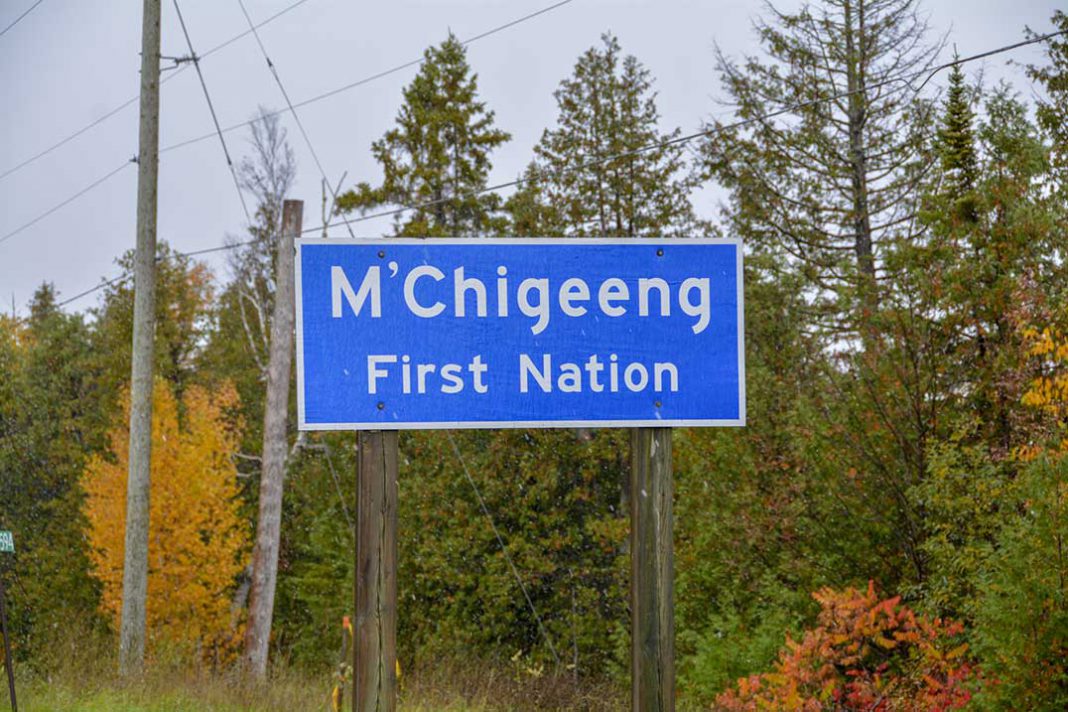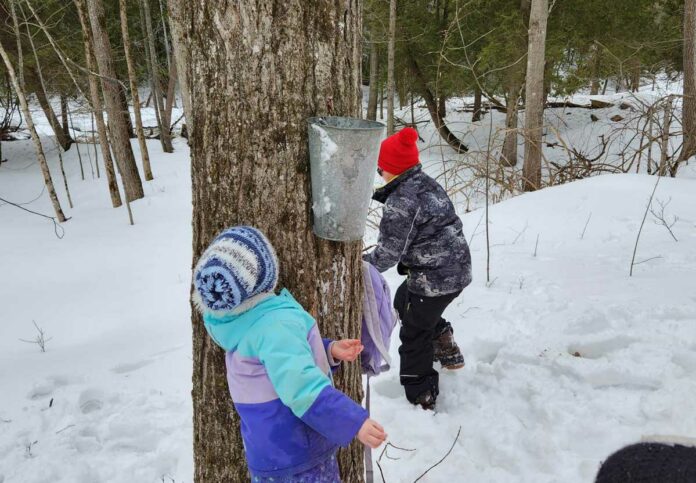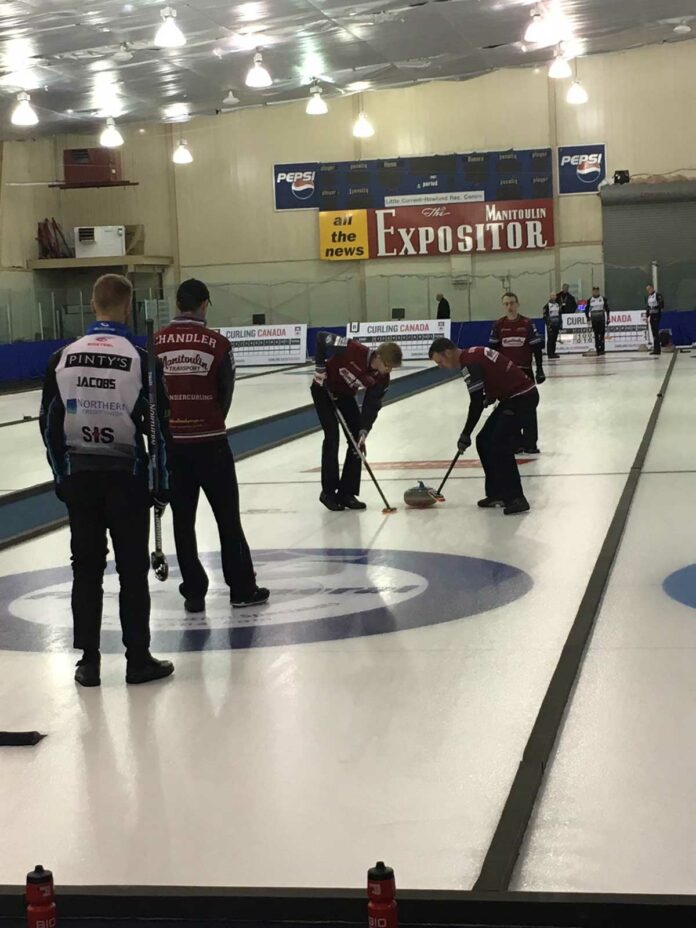Please note this list of candidates has been revised since the date of this publication and may not reflect the most recent information regarding this election. For the most recent information regarding the M’Chigeeng 2023 Chief and Council Election please visit:
https://mchigeeng.ca/2023-chief-and-council-elections/
M’CHIGEENG—Members of M’Chigeeng First Nation head to the polls in the coming week, with advance polls opening at the M’Chigeeng First Nation Community Complex on Wednesday, March 22 (from 11 am to 5 pm) and the main poll opening on Monday, March 27, also at the complex, between 9 am and 6 pm. A candidates’ forum took place on Monday, March 20 starting at 6 pm.
There are three candidates vying for the position of chief, including incumbent Ogimaa-kwe Linda Debassige and challengers Renee Corbiere and Floyd Ense. There are 32 candidates seeking a council seat. They include: They include Charles John Beaudin, Robert Beaudin, Perry Matthew Bebamash, Diane Louise Bebonang, Andrew M. Corbiere, Dennis W. Corbiere, Ellen Samantha Corbiere, Ryan Glen Corbiere, Travis Corbiere, Lisa Corbiere-Addison, Chelsea H. Cameron, Andrew Debassige, Howard Debassige, Keith Debassige, Mark Debassige, Marko Debassige, Martin Debassige, Melanie Debassige, Sam Debassige, Steven Debassige, Terry Debassige, Deborah Ense, Josh Patrick (Kevin) Eshkawkogan, Thomas Hare, Jason (Jay) McLeod Migwans, Henry Migwans, Lynn Migwans, Andrea Panamick, Henry Panamick Sr., James Panamick Sr., Martin Panamick and Neda Toeg.
The articles below outline the platforms of the three candidates for chief.
Wayne Trudeau
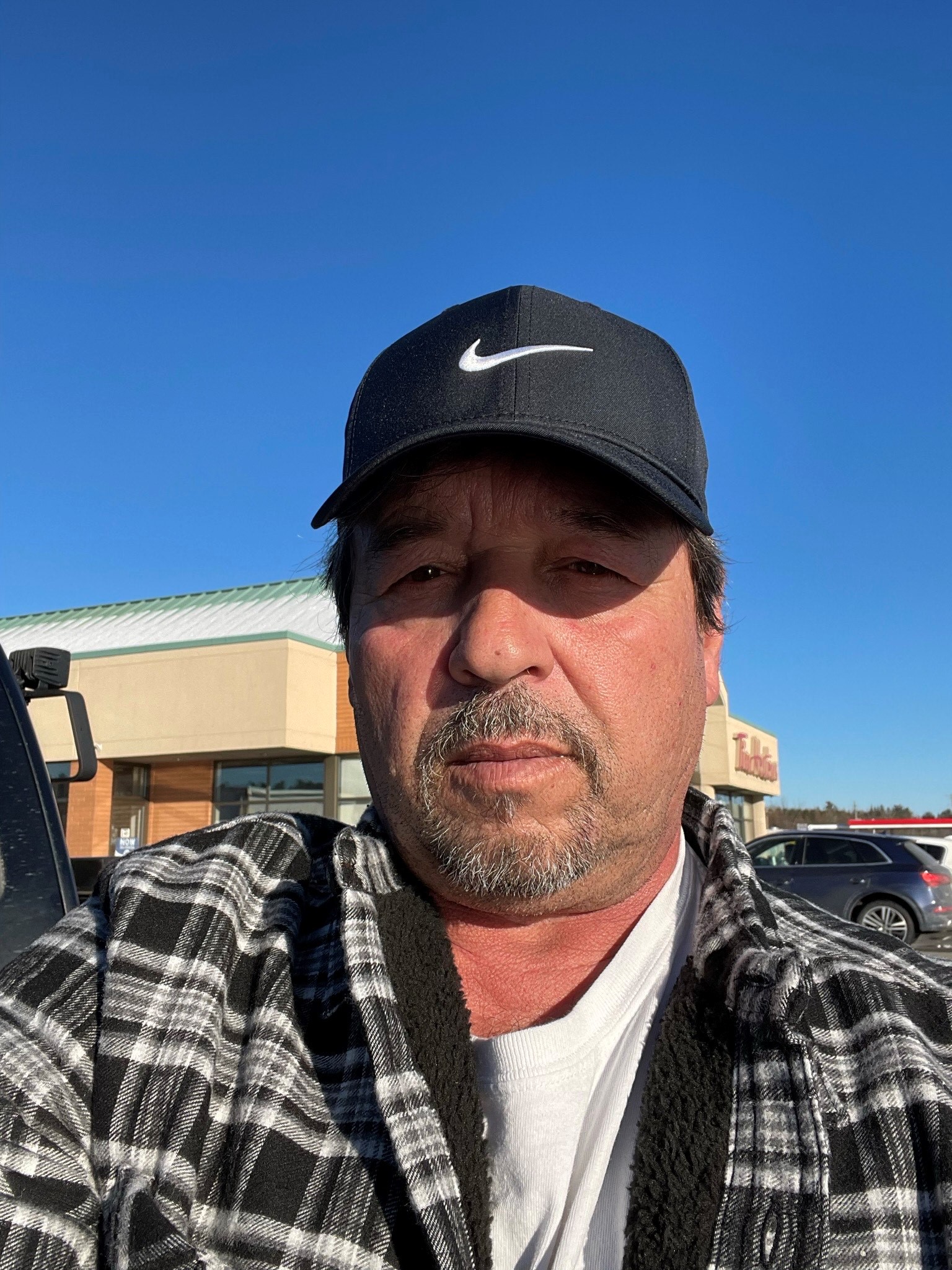
Wayne Trudeau N’Day Kenjenini, jijaak dodem, is a single father who has raised a 22-year-old son and adopted a 16-month-old (now going on 18-month) daughter.
Mr. Trudeau has been employed at Kenjgewin Teg since 2009 and built a home in the community in 2012. Initially employed in the student retention and recruitment role, he transitioned into Anishinaabe Aaadziwin, providing the cultural learning component of the foundational principles of the educational institute through land-based learning.
Mr. Trudeau’s educational background is in social work, graduating from Laurentian University with his honours BA in 2001 and worked for Wiikwemkoong Child and Family Services.
With no fear of getting his hands dirty, Mr. Trudeau worked in Sudbury for Total Cable Contracting.
Although originally a Wiikwemkoong band member, Mr. Trudeau transferred to M’Chigeeng First Nation in 1999 to be closer to his aging parents. “I decided to accept my nomination after taking time to consider the role and responsibilities,” he said, noting that he had been approached to run by elders in the community. He noted that the community has been experiencing growing trauma in recent years, particularly during the pandemic. “That isn’t going away any day soon,” he said, noting the challenges presented by addictions and safety issues in the community have everyone looking over their shoulders due to drugs and violence besetting the community. “It shouldn’t be that way.”
“We are not going to change anything if we just keep doing the same things,” he said. “It is obvious that what we are doing is not working. The time for change is now and people want change.”
Tackling the fear that is crippling M’Chigeeng’s ability to deal with the issues besetting it and bringing the community together, unifying against those who would drag the community down and building relationships both within and outside the community are among the first jobs that need to be tackled, he believes. “We need to find a different way of doing things,” he said.
“Our relationships with our neighbouring communities were damaged during the pandemic and have not yet fully recovered,” he said. “
Within the community, Mr. Trudeau said that he has observed that an increasing number of people are “picking up their kids and leaving the community out of fear.”
“I would like to see… I have a vision of a safe community,” he said. “A community working and living together and that is going to take some thinking outside of the box.”
Mr. Trudeau pointed to his decision to not put signs up, such as those of other candidates, as being in keeping with “our Anishinaabe way.”
Renee Corbiere
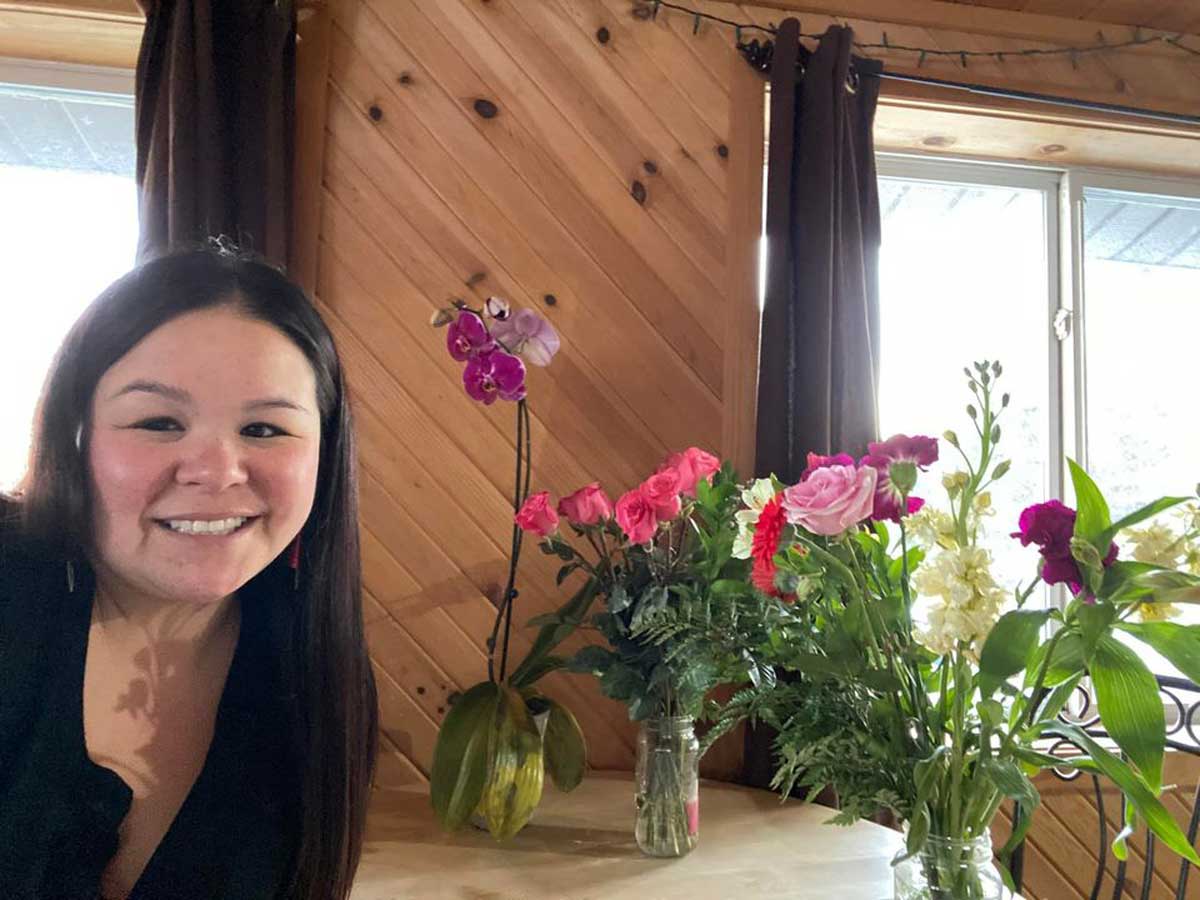
Candidate for chief Renee Corbiere is a lifelong M’Chigeeng resident, having grown up in the community and graduating from Manitoulin Secondary School. She holds a diploma in aboriginal community and social development and a bachelor of social work with honors from Metropolitan University (formerly Ryerson).
Ms. Corbiere resides in M’Chigeeng with her partner James Panamick and their two sons, James and Maximus.
“I am excited to be running for the seat of chief of our First Nation,” Ms. Corbiere says. “I was raised in a single parent home by Beverly Corbiere who instilled in me many great values such as courage, honesty and a strong work ethic.”
“For the past 10 years, it has been an honour to work for M’Chigeeng First Nation within the family resources department as a youth worker, community support worker, band representative and a family support worker. Being employed with M’Chigeeng First Nation has allowed me to understand the barriers should I be elected as chief,” Ms. Corbiere says.
“Education is our future and will be at the forefront of our vision and goals,” the candidate for chief continues. “It is our younger generations that will continue the work we are doing now. We need to equip them with the tools and resources to optimize success. Unity and transparency are what our community needs. Our people are the backbone of our community and the voice of the M’Chigeeng membership is important. I am a strong leader who will have those hard discussions to assist M’Chigeeng in progressing into a vibrant, healthy community. Education, unity and transparency, our children, youth and elders will be our priority.”
“Being a leader is only successful when you grow others!” Ms. Corbiere enthuses. “This is what I want for our community. To uplift, inspire, support each other and listen. Building trust in our community, by involving the people, will be my first step towards unity. M’Chigeeng is a great community, we just need to involve all our people in the projects and decisions.”
Ms. Corbiere plans to share the balances from M’Chigeeng’s revenue accounts “including community reinvestment funds that are currently under a moratorium, such as the revenues we get from the solar projects, investments, Casino Rama and land claims. We need community engagement on how these monies will be allocated and such questions answered like what are investment opportunities? Are we planning on purchasing any land for future economic development or housing etc.”
“M’Chigeeng is in need of a strategic planning session in order to achieve optimal success with regards to serving our membership,” she continues. “Committees need to be reinstated to ensure community involvement is represented and the community has a voice. The chief’s position does not need to be 24 hours a day, seven days a week if you are leading in a good way. We need transparency, accountability, democracy, and not the band administrative office enforcing micromanagement. I am not afraid of the challenge that M’Chigeeng faces right now nor will I be manipulated. I have the community’s and peoples’ best interest at heart and will serve the people to best of my ability.”
“As a community we need to seek clarity on decisions and have a community approach and share all pertinent information. Everyone is scared to answer questions because of liability and job security.
“Vote Renee Corbiere for chief of M’Chigeeng First Nation. Together for change. Miigwech. Miigwech. Miigwech.”
Linda Debassige
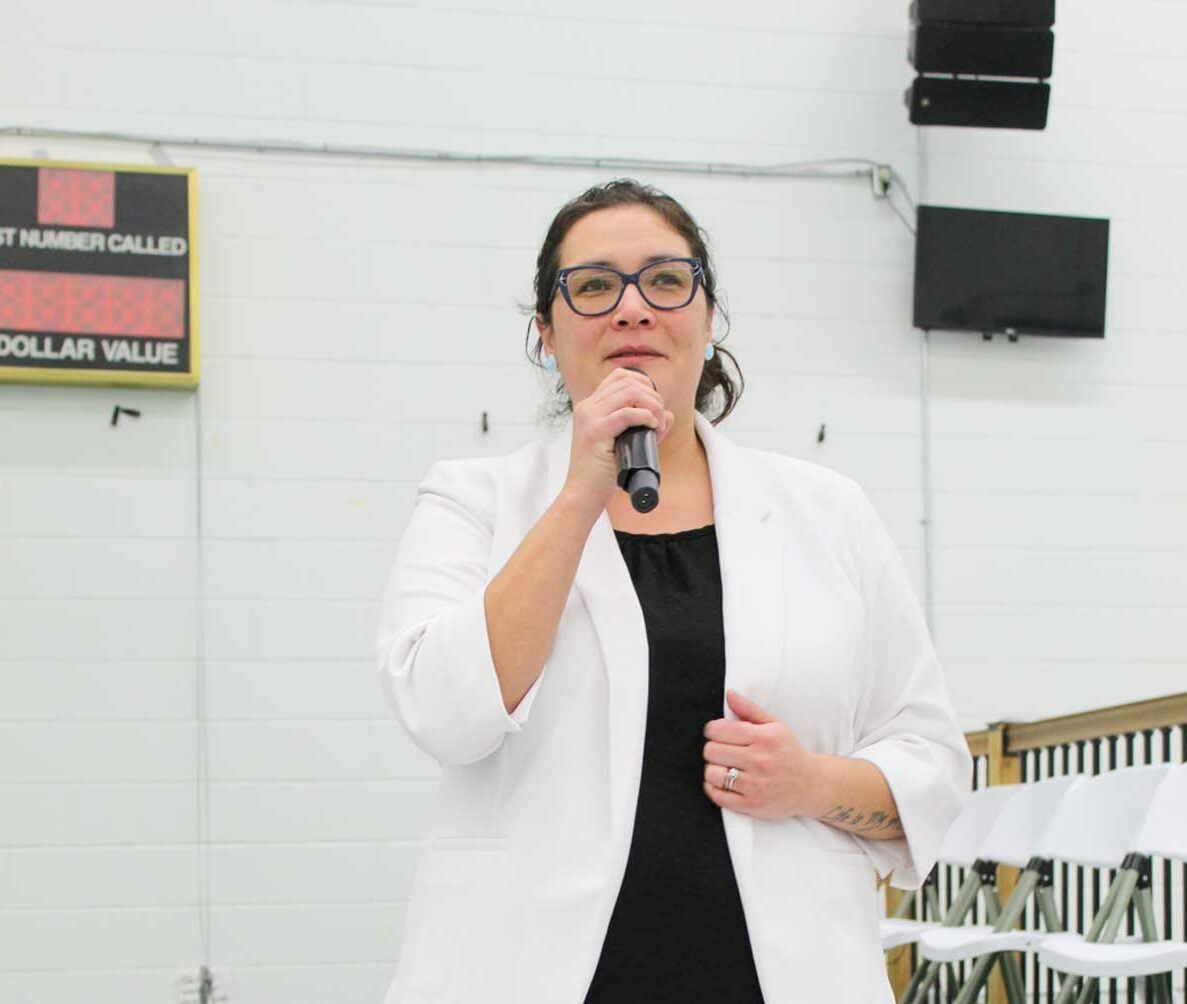
Incumbent Linda Debassige has served M’Chigeeng First Nation since 2013, first as a councillor and since 2015, as ogimaa-kwe. She estimates she has dedicated over 4,000 hours each year in service to the community, and she is not done with this journey.
“It truly has been a blessing and I am humbled to have received the support from our community and to have the privilege to work alongside many different councillors that have been elected,” Ms. Debassige said. “I can say the entire team, including our administration, has been able to advocate for the needs of the community at both the provincial and federal levels. Through this journey, I have developed a wealth of experience, developing those relationships at funding agencies, gaining the invaluable expertise in negotiations which have all benefitted our community.”
Those relationships and negotiation skills will be necessary in the coming years, she noted. There is a potential settlement that is currently being negotiated in the Robinson Huron Treaty annuity case, after which chief and council will need to engage band members through a series of consultations, to determine how funds will be used.
She is proud of the successes of Chief and Council throughout her terms, including participation in a class action. M’Chigeeng is one of 325 First Nations across Canada which have agreed to a $2.8 billion settlement. Once approved by the federal court, M’Chigeeng will receive $200,000 to develop and carry out a plan that addresses the revival and protection of Indigenous language, culture, heritage, or community wellness.
Language, culture and heritage have always been critically important to Ms. Debassige. During the current term, Ms. Debassige as ogimaa-kwe, along with council, spearheaded the revitalization of mental health and addictions programming in the community, creating a new department to concentrate on efforts that support the healing and wellness of the community with a mandate that this programming be inclusive of culture and language.
“There is a need to create and construct a healing and cultural centre to house all services and create safe spaces to allow our people to be supported in the best way possible,” she said. That space would house the mental health, addictions and outreach team in an inclusive space that allows “for all to come together to participate in programs and ceremonies that will help heal and uplift our people.”
Ms. Debassige wants to see both a youth council and an elders’ council incorporated into the governance structure. Also, along those lines, she acknowledges the need for a consultation code that outlines when and how the community needs to be consulted in relation to any matter under discussion by council, and how and when community needs to be consulted by government or industry, for example.
She wants to see a M’Chigeeng First Nation dedicated Board of Education that would build on the accomplishments of existing institutions including Lakeview School, Kenjgewin Teg and Weengushk Film Institute, and would include adult learning opportunities and a new building for Lakeview School.
“The time is now to really put action and effort into ensuring that our language is revitalized as it is our responsibility to do this,” said Ms. Debassige. “Many communities are creating smaller immersion schools to support language learning and revitalization. It would be unfair to only rely on Lakeview School for this major initiative as language learning and retention is a community responsibility and members of all ages should be able to participate. Together we can ensure our language survives.”
Ms. Debassige spoke to the years of advocacy and negotiation required to obtain funding and approvals to move forward with phase one of the waterline into the country project. Work will begin this spring. Phase two, where the water line is built down Spring Bay Road into the village, replaces water tanks currently in use and supports the creation of a new subdivision. The waste transfer station to be completed this year is also a result of continued advocacy and planning, she said. “We successfully advocated and received additional and full funding for this project.”
Other community infrastructure projects, including upgraded lagoons, a more environmentally safe wastewater treatment system, and a much-needed water tower remediation, all required the strong advocacy and negotiation skills and experience that Ms. Debassige brings to the table.
A council-approved study found over six million dollars is needed to repair and maintain all M’Chigeeng roads. “There is very limited funding yearly for this and efforts are needed to make sure we get the adequate funding required to keep our roads safe and our community safe,” said Ms. Debassige.
“We continue to address addictions and drug usage in our community, however, we will continue to rely on the community to report suspicious and illegal behaviour,” she said. “We need to work together as a community to achieve healthy lifestyles which will come from helping one another so that there is no longer any need or desire for drug use which will ultimately eliminate any need for drug dealers.”
“We need to get back together in a united way, to bury old grudges, so that together we can be a healthy and prosperous community.”
Floyd Ense
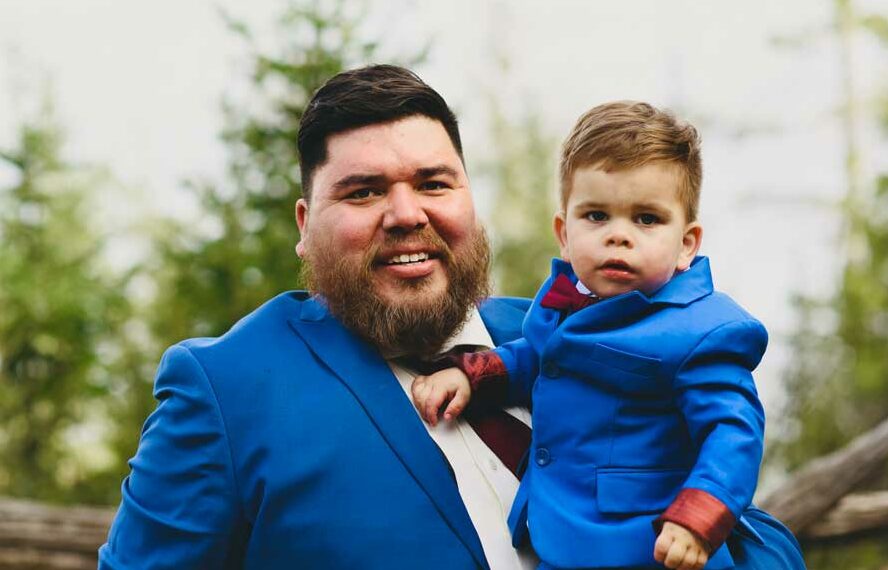
Candidate for M’Chigeeng ogimaa Floyd Ense knows the importance of mental health, both for the individual and a community. As a mental health clinician working with M’Chigeeng Health Centre he knows only too well the impact trauma has on all aspects of health and wellbeing and that knowledge informs his approach to community leadership.
“Working in mental health has brought everything together for me,” he said. “It just made so much sense—how we can help our people when they are struggling.”
Mr. Ense makes no bones about the limitations of the job, however. “I don’t want to make promises,” he said. “At the end of the day, you are just one individual at the table. Council together makes the decisions.”
In fact, Mr. Ense says that decision making should go far beyond the council table to engage the community itself in finding the solutions to the issues facing M’Chigeeng. “There is a lot of pain in our community, a lot of hurt,” he said. “Instead of dealing with it we hold up roadblocks.”
Mr. Ense notes that the re-establishment of culture in the community would go a long way toward strengthening the bonds between youth and elders. “We need to make sure the culture is strong in the community,” he said.
“Our communities have the highest rates of everything,” Mr. Ense pointed out, “yet we do not prioritize dealing with those issues.”
The route to dealing with that core issue is to be found in building relationships and discussing solutions in a healthy way. “We are not all going to agree on everything, but we need to communicate in a healthy way.” That includes strengthening relationships with those agencies the band works closely with.
Bringing decision making back to committees and department managers will help to ensure that issues are dealt with by those who have the professional training and experience to find solutions that work.
“We need to have a strategic plan for each department,” said Mr. Ense, noting that short term fixes and crisis management are a poor stand-in for a well thought out and long-term approach. “Right now, there isn’t a 10-year strategic plan or even a five-year plan,” he said.
Mr. Ense said that he wants to bring mental health back into the band’s education system in order to provide youth with the tools they need to cope with trauma, be it generational or acute. As it stands, he notes, current mental health workers in the community are becoming burnt out. “Everyone is so understaffed,” he said. “We need to advocate for better funding and to prioritize our workers.”
Mr. Ense said he doesn’t believe the solutions to the challenges facing the community will come about in the short term. “This isn’t all going to be fixed in one term of council,” he said. Still, Mr. Ense said he will soon be releasing a comprehensive list of his ideas in a brochure that will provide greater detail on his thought about health, mental health, education, housing, finance, administration, public works, Ontario Works, youth, language, culture and leadership.
Please note this list of candidates has been revised since the date of this publication and may not reflect the most recent information regarding this election. For the most recent information regarding the M’Chigeeng 2023 Chief and Council Election please visit:

